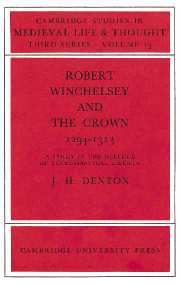Book contents
- Frontmatter
- Contents
- Preface
- Abbreviations
- Introduction
- 1 THE MAN: HIS LEARNING AND SANCTITY
- 2 EPISCOPAL COLLEAGUES
- 3 TAXATION AND POLITICS 1294–1296
- 4 TAXATION AND POLITICS 1297
- 5 TAXATION AND POLITICS 1298–1313
- 6 ROYAL CLERKS AND THE CURE OF SOULS
- APPENDIX: TABLE OF ROYAL TAXATION OF THE CLERGY 1294–1313
- Bibliography
- Index of manuscripts
- General index
5 - TAXATION AND POLITICS 1298–1313
Published online by Cambridge University Press: 07 October 2009
- Frontmatter
- Contents
- Preface
- Abbreviations
- Introduction
- 1 THE MAN: HIS LEARNING AND SANCTITY
- 2 EPISCOPAL COLLEAGUES
- 3 TAXATION AND POLITICS 1294–1296
- 4 TAXATION AND POLITICS 1297
- 5 TAXATION AND POLITICS 1298–1313
- 6 ROYAL CLERKS AND THE CURE OF SOULS
- APPENDIX: TABLE OF ROYAL TAXATION OF THE CLERGY 1294–1313
- Bibliography
- Index of manuscripts
- General index
Summary
CONFLICT WITH THE CROWN 1298–1305
The period between the crisis of 1297 and the archbishop's suspension from office in 1306 was one of intense activity for Winchelsey. It was during these years that he undertook long visitations of the dioceses of Rochester, Chichester, Worcester, London, Norwich and Winchester. His meticulous examinations of these dioceses led him into conflict with Edward I notably concerning cases which posed the problem of the non-residence of royal clerks in their churches and the problem of the exemption from ordinary jurisdiction claimed by royal free chapels. Discussion of these issues, important for an understanding of the archbishop's relations with royal government, must await the last chapter. The critical constitutional issues of 1297 continued to figure large in the relations of king and Church, just as they did in the relations of king and magnates, and the themes which have been analysed in previous chapters relating to taxation and Magna Carta must be traced through to the suspension of Winchelsey, which was, by Edward's clear admission, an act of retribution for the part the archbishop played in the rebellion of 1297. The issues of 1297 did not die.
But there were other problems that involved the archbishop and the Crown during this period, problems which were not related to these constitutional questions, nor related to the rights of royal clerks and royal chapels.
- Type
- Chapter
- Information
- Robert Winchelsey and the Crown 1294–1313A Study in the Defence of Ecclesiastical Liberty, pp. 177 - 268Publisher: Cambridge University PressPrint publication year: 1980

